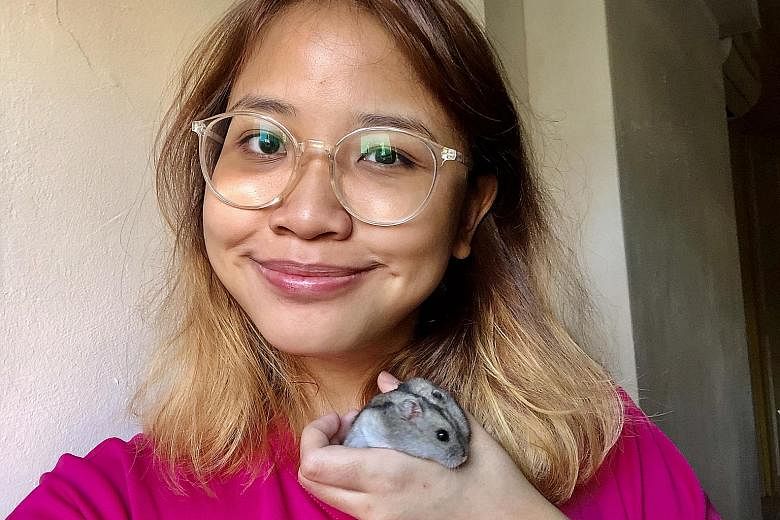Undergraduate Sarah Chua had been thinking of getting a dog for a while. It was not until the circuit breaker that the 22-year-old finally adopted one.
With her family home most of the time during that period - she lives with her parents and younger sister - she found the opportunity to talk to them about the adoption.
In May, her family adopted a five-year-old Singapore Special from dog shelter Exclusively Mongrels. Ms Chua named her Tau Pok (fried beancurd) because the dog's fur is brown and as she loves food.
She says: "Life before Tau Pok was monotonous, especially at the start of the circuit breaker. I missed seeing my friends and it was boring taking walks on my own."
Animal welfare organisations tell The Sunday Times more people have expressed interest in adopting or fostering pets in recent months.
With work-from-home arrangements, new pet owners are better able to help the animals adjust to their new homes and routines.
Operations manager Jiny Mohandas has always wanted a dog and, like Ms Chua, she adopted one during the circuit breaker.
The 39-year-old and her business analyst partner adopted a four-year-old Singapore Special from Causes for Animals Singapore in May.
She says: "Having my partner work from home during this period helped the dog get accustomed to our home and us to settle into a new routine."
Companionship is one reason for growing interest in pet ownership during the pandemic.
Dr Pauline Sim, 64, a consultant psychiatrist at Mount Elizabeth Medical Centre, says that cut off from social contact, people feel isolated. Pets, especially dogs and cats, make wonderful companions, providing warmth and distraction, she adds.

Mr Colin Chew, 52, a volunteer with Just For Paws, says enquiries for adoption doubled during the circuit breaker, compared with the same period last year. Since April, the privately funded shelter has received 30 inquiries and six dogs were adopted. Three dogs were adopted in the same period last year.
Mr Chew says: "Pet ownership is a long-term commitment. You have to be available to care for the pet even if you have to go back to work in the office."
Ms Lee Pin, co-founder of Chained Dog Awareness in Singapore, a volunteer-run advocacy group which specialises in helping dogs suffering from confinement or tethering for long hours, agrees. During the pandemic, she says, more people realise that a pet can provide companionship and make their lives more fulfilling, especially when they give a home to an animal in need.
But pandemic or not, she adds, the usual rules of pet ownership apply, such as being committed to care for the animal.
Freelance lecturer Theresa Huang, 37, adopted a chihuahua on April 4, three days before the circuit breaker kicked in.
She says the dog, Chewie, has been a source of comfort, helping to stave off loneliness when she missed family and friends. She lives with her husband, a 43-year-old sales manager, who supported her decision to adopt a dog.
She says: "People may think having a pet is to help ease your own loneliness, but they also need our company and care."
Community manager Mihyun Chung, 28, who is from South Korea, adopted a seven-year-old Singapore Special through Chained Dog Awarenesslast month.
She says: "Like a lot of people, the pandemic changed my lifestyle and daily routine. It also provided me with the inspiration for my new business idea, which afforded me the time to take care of a dog."
She is in the midst of switching to self-employment, which will allow her more control over her time.
Companionship was a key factor for undergraduate Atiqah Gafar, who lives alone, to adopt a pet last month. She chose a hamster as she finds it easier to care for one than a cat. Her mother died of leukaemia last year and her father died 10 years ago.
The 22-year-old, who has four elder siblings but chooses to live alone, says: "Most of my friends who have cats were puzzled and amused when I said I wanted a hamster. They were also concerned that hamsters have a short lifespan. But dealing with the loss of my parents has made me stronger and more accepting that people and animals will die one day."
Cat Welfare Society president Thenuga Vijakumar, 35, has also noticed an increase in adoptions.
While it does not run a shelter, it facilitates adoptions through its website and Instagram account. Based on the online posts, adoptions are about 20 a month since phase two, compared with 10 to 15 before the circuit breaker.

Ms Vijakumar says: "I think people simply had the time to fully consider all the requirements for adoption. For example, one requirement is to put mesh up around the house to ensure the safety of the cat.
"With work-from-home arrangements, we found that people had more time to research and implement these steps."
At Chained Dog Awareness, Ms Lee observes a spike in the number of people looking to adopt or foster dogs since phase two, which started on June 19.
In June, July and this month, the group received 20 such inquiries - double the number pre-Covid-19.
For those who cannot commit to caring for a pet in the long term, fostering is an alternative to help animals in need.
That was what Ms Sushma Soma, 33, did.
Pre-Covid-19, the Indian classical vocalist regularly travelled to India, Europe and the United States for training and performances, which were curtailed when the pandemic broke out.
She fostered a dog through Chained Dog Awareness, caring for it from Aug 1 to 18 before it found a potential adopter.
She says: "Fostering allowed me to learn how to care for a dog and ease my feelings of uncertainty over my job and the future.
"But the biggest lesson from the experience is learning to let go and live in the present moment."




